语文版中职英语(基础模块-上册)Unit-3《Campus-Life》课件2
中职英语基础模块上册课文ppt详解.

I led my new classmate to our classroom
be the same as…与…相同(一样)
例如:
Your classroom is the same as ours. 你们的教室和我们的一样。
第18页,共30页。
even if: “即使、虽然”,引导让步状语从句
一天天过去了,终于男孩能够告诉爸爸他把所有的钉子拔完了。爸 爸拉着他的手来到篱笆前,让他看篱笆上留下的洞,并和他说:你 看看这些洞,篱笆墙还能回到原来的样子吗?当你在发脾气时说的 话,留在人们心里的伤痕就像这些洞一样,即使你说了了对不起, 伤痕也永远留在了那里,朋友就是最珍贵的珠宝,他们能让你开心 地微笑,让你感到快乐,所以绝不要伤害他们。
例如: The question is not difficult at all. 这个问题一点也不难。 Translate:我一点也不喜欢他。 I don’t like him at all.
第15页,共30页。
• ask sb to do sth: 请求某人做某事 • 例如:
• He asks me to lend him some money. • 他请求我借点钱给他。 • pull out: 拔…出来; 拖出去 • 例如: • He pulled out the dog. • 他把狗拖出去。 • be able to: 能够做.. • 例如: • The boy is able to sing English songs. • 这个男孩会唱英文歌。
6. in anger 7. even if
8. make sb. do sth.
9. since then
中职英语基础模块上册unit ppt课件
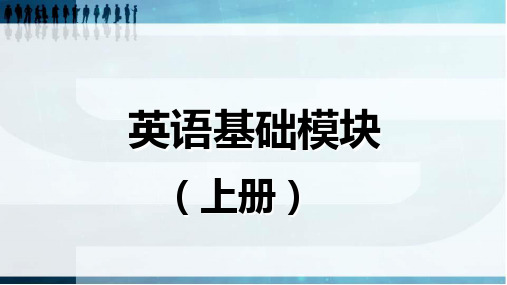
Kissing hands
吻手礼:吻手礼源于古代维京人用手向其日耳曼君 主递礼物的风俗,流行于欧美上层社会,是一种仅对贵 族已婚妇女实施的礼节。吻手礼一般在室内举行,并且 仅限于手腕以下部位,一般是指背。
cross one's
hands 双手合十:
这种礼仪多见于 信奉佛教的国家,比如说泰国。 泰国人见面时往往低头问候, 并将双手合十于胸前。小辈见 长辈双手举到前额高度,平辈 到鼻子高度,而长辈还礼则只 需到胸前即可。另外,泰国认 为头部是神圣的,不能随意摸 别人的头。
你呢
I'm fine,too.Tha
nk you! 我也是,谢谢
LOREM IPSUM DOLOR
Nice to meet you! 很高兴见到你 Nice to meet you,too! 也很高兴见到你
• Notes:
•
• 1. Introductions are important because a proper introduction will leave a good first impression upon others.
•.
Warm-up
Look at the picture and tick. Emily and Jenny meet each other for the first time. Tick what they would say.
( ) 1. Hi, Jenny! ( ) 2. Good morning Jenny. Nice to meet you. ( ) 3. Hello, I’m Emily. ( ) 4. Bye. See you later. ( ) 5. How do you do? ( ) 6. Thank you!
语文版中职英语(基础模块 上册)Unit 3《Campus Life》ppt课件3

*Headmaster, students, headteacher, professor, homework, exam, test
At school /On campus
• well [wel] • adv. 很好地;充分地;满意地;适当地 • adj. 良好的;健康的;适宜的 • n. 井;源泉 • go well 进展顺利
• usually ['juʒuəli] • adv. 通常,经常 • sometimes ['sʌmtaɪmz] • adv. 有时,间或 • skill [skil] • n. 技能,技巧;本领,技术 • training ['treiniŋ] • n. 训练;培养;瞄准;整枝
• show [ʃəʊ] • vt. 显示;说明;演出;展出
n. 显示;表演;炫耀 • [ 过去式showed 过去分词showed 或 shown 现在分词showing • show concern about • 对……的关心
help 英[help] • vt. 帮助;补救 • n. 帮助;补救办法;帮忙者;有益的东西 • with the help of • classmate ['klæsmet] • roommate['ruːmmeɪt] ['rummet] • n. 室友
• learn [lə:n] • vt. 学习;得知;认识到 • cooking ['kukiŋ] • n. 烹饪 • adj. 烹调用的 • v. 烹调;筹划(cook的ing形式) • cooker ['kukə] • n. 炊具;
基础模块上册 Unit3 Campus life
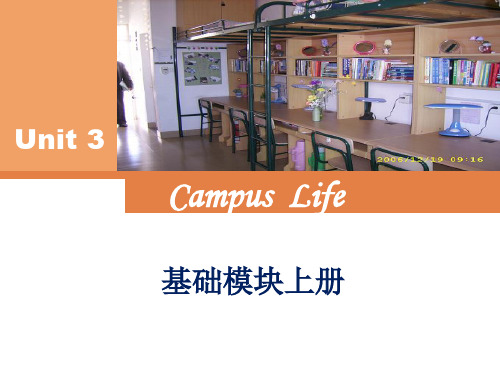
Reading
Unit 3
Activity 6 对比汉语和英语信函的格式
李宁: 你好!
September20,2009 Dear Jennifer:
4) at first
eg: He couldn’t speak English at first. 起初他不会说英语。
Language Points
Unit 3
P2r.oRceeaddiunrge
第3段 5) follow 跟随;本句中译为“听得懂,跟得上”
eg: The teacher asked: “Could you follow me?” 老师问: “你们能听懂吗?”
me.
Reading
write an e-mail to … write a letter to….
Unit 3
Unit 3
Reading
Unit 3
Activity 2 Have you called / written a letter / sent an E-mail to invite your friends to visit your new school ?
Reading
Unit 3
PeThe answers to the questions.
1. His friend, Jennifer 2. A month ago. 3. He couldn’t follow the teachers in class, because he
cannot speak and understand Chinese. 4. There are 7 classes in a day. Four in the morning ,
中职英语基础模块上册第三单元课文
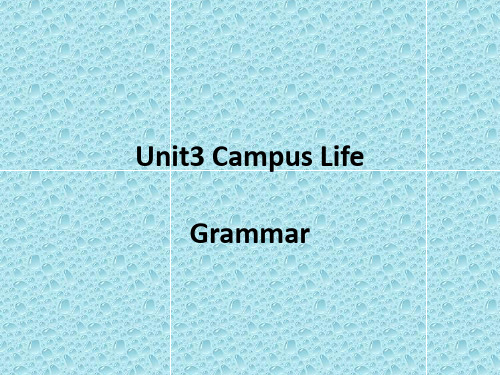
• 一、名词的分类
• • • • • • • • • • • 名词可分为普通名词和专有名词两大类。 1. 普通名词又可分为: (1)个体名词。如:cup,desk,student等。 一般可数,有单复数形式。 (2)集体名词。如:class,team,family等。 一般可数,有单复数形式。 (3)物质名词。如:rice,water,cotton等。 一般不可数,没有单复数之分。 (4)抽象名词。如:love,work,life等。 一般不可数,没有单复数之分。 2. 专有名词:如:China,Newton,London等。
• 动词(v.):表示动作或状态。Jump, eat • 副词(adv.):修饰动词、形容词或其他副词,very, early • 介词(prep.):表示名词或代词与句中其他词的关 系。On, with • 连词(conj.):连接词与词、短语与短语或句与句 and, but • 感叹词(interj.):表示说话时的喜悦、惊讶等情感, oh, well
• 4. 以-f和-fe结尾的名词: • (1)变-f或-fe为v再加-es,读音为 [vz]。如:thief--- thieves,wife ---wives, half--- halves等。 • (2)直接在词尾加-s,如:roof--roofs,gulf ---gulfs,chief ---chiefs,proof --proofs等。 • 5. 以-o结尾的名词:
• (1)以“辅音字母+o”结尾的名词后直接加-es,读音为 [z]。如:hero heroes,potato potatoes,tomato tomatoes等。 • (二)不规则名词的复数形式 • 1. 改变单数名词中的元音字母或其他形式。如: man men,woman women,tooth teeth,foot feet, mouse mice,child children等。 • 2. 单复数形式相同。如:sheep,deer,fish等,以 及由汉语音译表示度量、币制等单位的名词。如:yuan. 另外以-ese或-ss结尾的表示民族的名词也一样同形。如: Chinese,Japanese,Swiss等。 • 以-an结尾或其他形式结尾的表示民族、国家的人 的名词变复数时在词尾加-s.如:Americans,Asians, Russians,Australians,Italians,Germans等。 • 注意:Englishman Englishmen,Frenchman Frenchmen.
语文版中职英语(基础模块 上册)Unit 3《Campus Life》ppt课件2

P20 Reading Comprehension (阅读理解) Jennifer 1. David is writing a letter to ___________. Vocational 2. Now David is a student of Haidian _________ School Beijing _________ in __________. Chinese 3. David came to Beijing to learn __________ cooking ago _________ a month _________. got to 4. When he _________ ________ this school, everything ___________ ________ strange to him. was speak At 5. ________ first, David could not________ and _________ understand Chinese.
P19 Reading
A Letter to a Friend
第3段译文: 一个月前,我来到北京。当我到这所学校的时候,一 切对我来说都是陌生的。你知道,我不会说也不懂汉 语。起初,我听不懂老师讲课并感到紧张。幸运是, 这里所有的老师和同学都对我很友好和善,十分关心 我的生活和学习。现在,我可以高兴的说,在老师和 同学的帮助下,一切进展顺利。
P19 Reading
A Letter to a Friend
第4-6段译文: 我们每周一到周五上午四节课,下午三节课。上午, 我们通常在教室里上课。下午,我们有的时候去技术培 训中心练习烹饪技术。 课后,我们有很多有趣的活动。在周末,我经常去上 汉语语言课,或在这座伟大美丽的北京城里观光。我在 这里过得很愉快。 你怎么样?我很想念你。我的新电话号码是: 13523796588,我的e-mail地址是: dbrown@。你可以给我发e-mail或手机短信。 致以最美好的祝愿!
《英语 基础模块》上册 Unit 3 Campus Life

Language & Culture Press
Unit 3
Speaking
Activity 1 Say something about your school . 说说你的学校,请练习使用下列句型.
What is this / that? This / That / It is _our library . These / Those / They are my classmates. These are some / many / a lot of _trees_ in _our campus_. These are not any _computers in my classroom.
Speaking
What’s this in English? It’s a computer.
Language & Culture Press
Unit 3
Speaking Activity 4 Draw a picture of your own rooms and write down the English names of the things in your rooms. Then talk about your rooms like this: What’s this in English? It’s a / an ... Is this a …?
Unit 3
Speaking
What’s this in English? It’s a jacket.
Language & Culture Press
Unit 3
Speaking
What are these in English? It’s oranges.
语文版中职英语基础模快上复习教案Unit 3 Campus Life Revision
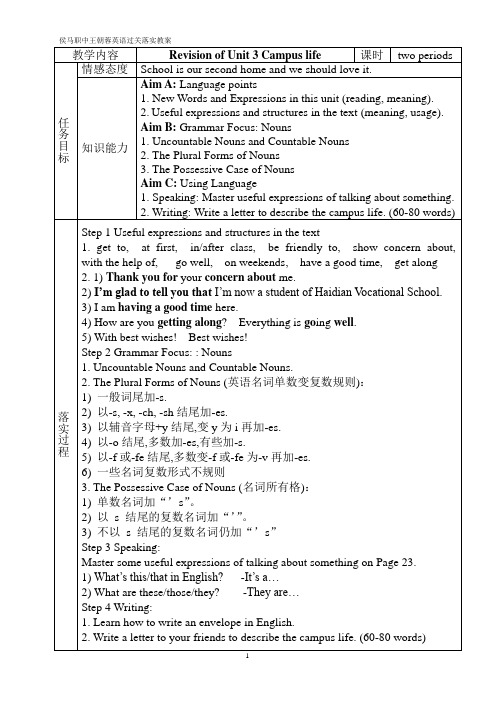
Revision ofUnit 3 Campus life
课时
twoperiods
ቤተ መጻሕፍቲ ባይዱ任务目标
情感态度
School is our second home and we should love it.
知识能力
Aim A:Language points
1.New Words andExpressionsin this unit (reading, meaning).
5) With best wishes! Best wishes!
Step 2Grammar Focus::Nouns
1. Uncountable Nouns and Countable Nouns.
2. The Plural Forms of Nouns (英语名词单数变复数规则):
1)一般词尾加-s.
2.1)Thank you foryourconcern aboutme.
2)I’m glad to tell you thatI’m now a student of Haidian Vocational School.
3) I amhaving a good timehere.
4) How are yougetting along? Everything isgoingwell.
小结作业
1.Write a letter to your friends to describe the campus life. (60-80 words))
2. Finishthe test inUnit3on Page 42-46 inGuide and Practice.
板书设计
教学评价
中职英语基础模块上册第三单元课文

A
2
• 动词(v.):表示动作或状态。Jump, eat • 副词(adv.):修饰动词、形容词或其他副词,very, early • 介词(prep.):表示名词或代词与句中其他词的关系。On, with • 连词(conj.):连接词与词、短语与短语或句与句and, but • 感叹词(interj.):表示说话时的喜悦、惊讶等情感,oh,之分。
•
(4)抽象名词。如:love,work,life等。
•
一般不可数,没有单复数之分。
•
2. 专有名词:如:China,Newton,London等。
A
4
• 名词可数名词和不可数名词 • 不可数名词一般没有复数形式, • 如:water---some water , milk---a glass of milk • 可数名词有单数和复数两种形式。
wife ---wives,half--- halves等。
•
(2)直接在词尾加-s,如:roof--- roofs,gulf ---gulfs,chief -
--chiefs,proof ---proofs等。
•
5. 以-o结尾的名词:
A
8
• (1)以“辅音字母+o”结尾的名词后直接加-es,读音为[z]。如:hero heroes,potato potatoes,tomato tomatoes等。
•
其读音为[iz]。
•
如:bus ---buses,box ---boxes,
•
watch ---watches,dish ---dishes等。
A
6
• 3. 以-y结尾的名词:
(1)以“辅音字母+y”结尾的名词,把y改为i再加es,读音为[iz],
中职英语基础模块上册Unit3
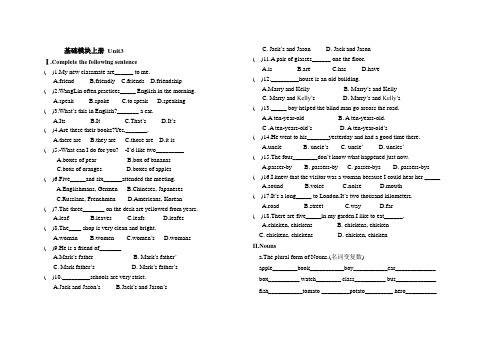
基础模块上册Unit3Ⅰ.Complete the following sentence( )1.My new classmate are______ to me.A.friendB.friendlyC.friendsD.friendship ( )2.WangLin often practices_____ English in the morning.A.speakB.spokeC.to speakD.speaking ( )3.What’s this in English?_______ a car.A.ItsB.ItC.That’sD.It’s( )4.Are these their books?Yes,_______.A.there areB.they areC.those areD.it is( )5.-What can I do for you? -I’d like two_________A.boxes of pearB.box of bananasC.boxs of orangesD.boxes of apples( )6.Five_____and six______attended the meeting.A.Englishmans, GermenB.Chineses, JapanesesC.Russians, FrenchmenD.Americans, Korean ( )7.The three_______ on the desk are yellowed from years.A.leafB.leavesC.leafsD.leafes ( )8.The____ shop is very clean and bright.A.womanB.womenC.women’sD.womans ( )9.He is a friend of_______A.Mark’s fatherB. Mark’s father’C. Mark father’sD. Mark’s father’s ( )10._________schools are very strict.A.Jack and Jason’sB.Jack’s and Jason’sC. Jack’s and JasonD. Jack and Jason( )11.A pair of glasses______ one the floor.A.isB.areC.hasD.have( )12._________house is an old building.A.Marry and KellyB. Marry’s and KellyC. Marry and Kelly’sD. Marry’s and Kelly’s( )13._____ boy helped the blind man go arcoss the road.A.A ten-year-oldB. A ten-years-old.C .A ten-years-old’s D. A ten-year-old’s( )14.He went to his_______yesterday and had a good time there.A.uncleB. uncle’sC. uncle’D. uncles’( )15.The four________don’t know what happened just now.A.passer-byB. passers-byC. passer-bysD. passers-bys ( )16.I knew that the visitor was a woman because I could hear her _____A.soundB.voiceC.noiseD.mouth( )17.It’s a long_____ to London.It’s two thousand kilometers.A.roadB.streetC.wayD.far( )18.There are five_____in my garden.I like to eat______.A.chicken, chickensB. chickens, chickenC. chickens, chickensD. chicken, chickenII.Nounsa.The plural form of Nouns.(名词变复数)apple________book___________boy___________car_____________ box__________ watch________ class__________ bus_____________ fish___________tomato _________potato_________ hero__________photo_________ zoo___________ piano_________ radio___________ family_________ baby__________ factory_________ toy___________ wolf__________ thief__________ wife_________ knife____________ leaf___________ chief_________ serf____________ roof___________ woman _________child_________ foot__________ sheep___________ tooth__________ deer_________ mouse_________ goose___________ looker-on__________________ son-in-low_________________ grown-up_________________ man teacher_________________ Chinese__________________ Englishman_________________b. The possessive case of Nouns(名词所有格)我朋友的自行车__________________学生们的书__________________ 妇女节_________________________ 中国的历史__________________ 他岳母的房子______________________________________露西和莉莉的妈妈__________________________________她爸爸的一个朋友__________________________________他们的两张照片____________________________________两小时的路程_________________ 桌子腿_______________________ III.Translate the following sentences.1.一周前,我来到北京。
中职英语基础模块三Unit课件演示文稿

第十九页,共54页。
Scan and choose.
Know your neighbors. Watching out for each other is one of the best defenses against crime.
第六页,共54页。
第七页,共54页。
Listen and answer.
They are mainly talking about safety cautions.
第八页,共54页。
Listen and tick.
(
) 1. There was a car accident last night.
Dear all, Welcome to our community! We’d like to tell you some easy ways to make you, your
apartment and your belongings much safer. Make sure that the locks on all doors of your apartment are changed when you move in.
3
2
4
1
第十七页,共54页。
Discuss and list.
Don’t talk to strangers. (You should) Lock all your windows when you go to bed at night. Don’t talk on the cell phone when walking toward the room.
中职英语基础模块修订版(上)unit3ppt课件

S2: Who do you often read with? S1: Mary, my cousin.
Listening and Speaking
3 Listen again and act. 再听录音,根据提示表演对话。
play basketball play football
3 Listen again and act. 再听录音,根据提示表演对话。
do shopping do reading
S1: What do you usually do after school, Amy?
S2: I usually do shopping with my sister. It’s a lot of fun.
Listening and Speaking
5 Read and discuss. 根据示例谈论萨姆的活动。
What is Sam doing at 12:00 at noon? He is having lunch.
Listening and Speaking
5 Read and discuss. 根据示例谈论萨姆的活动。
take a walk
play ping-pong watch TV
take a nap
Listening and Speaking
5 Read and discuss. 根据示例谈论萨姆的活动。
What is Sam doing at 8:00 in the morning? He is having breakfast.
参考译文
midnight:午夜,半夜12点; until midnight:直到午夜。
最新语文版中职英语(基础模块-上册)Unit-3《Campus-Life》word教案

Unit 3 Campus Life 分课时第3课时教学设计32分钟操练要求学生以小组合作竞赛的形式完成下面的操练,向学生说明竞赛分为三轮,三轮成绩累加,记录团体成绩。
1.第一轮:1)呈现学校建筑照片,引导学生发挥想象描绘图片。
教师适当做句型提示,如:Thisis….There is….Look at…规则:单词,句子描述皆可。
单词描述一次,小组记录1分,句子描述一次,小组记录2分。
(鼓励评价).需要注意的是学生表达不受限。
在学生充分表达之后,教师给出典型句型。
2.第二轮:1)放一遍课文2)知识点回顾学生观看图片,思考,表达。
1.听录音,回忆David的校园生活。
2.明确竞赛规则,团结合作,积极1)充分考虑职教生的基础和接受能力,设计本环节为本节课的高潮部分,通过情境让学生体验语言,让学生模仿和套用。
进行大量操练,在无意识中学习,接受和掌握,是英语教学的一种要求,一种境界,最终实现对语言的交际性运用。
2)小组竞赛在培养抢读,抢译。
抢对一题得1分,和第一轮成绩累加在一起。
3.第三轮:引导学生畅谈校园生活。
1)仿说阶段:呈现一些情景和课文句式,要求学生结合校园生活实际仿说。
句子描述一次,小组记录2分2)自由发挥阶段。
引导学生思考后对校园生活进行补充表达。
学生以小组为单位讨论后发言,难度提升了,所以每参与一次加3分。
4..教师将三轮比赛成绩累加在一起,对学生的参与进行鼓励性评价。
播放职教生活场景照,请学生听一首励志歌曲参与。
学生团结合作和竞争意识的同时,更大程度地提高了学生的课堂参与度。
3)教师的鼓励性评价调动了学生的主观能动性。
6分钟知识技能巩固书信接龙游戏教师说:“歌听完了,同学们是不是更有力量了呢?下面让我们全体同学一起合作做一个书信接龙的游戏吧!每人一句话,完成一封信!像我们的父母或朋友介绍我们的校园生活吧,一起加油,想到了就说!争取不要中断啊Comeon!按照教师提供的书信格式说下去。
从上一环节的说句子过渡到本环节接句子,对学生提出了更高的要求,符合学生的认知规律,并增强了趣味性。
中职英语基础模块修订版上unit3教材课件

去游泳
Warming up
play badminton
打羽毛球
Warming up
play basketball
打篮球
Warming up
play ping-pong
打乒乓球
Warming up
go jogging
慢跑
1. Mike plans to go hiking this weekend.
3 Listen again and act. 再听录音,根据提示表演对话。
do shopping do reading
S1: What do you usually do after school, Amy?
S2: I usually do shopping with my sister. It's a lot of fun.
参考译文
莉萨:我喜欢待在家里,看书、看电视、听 音乐。我不喜欢运动和户外活动。
Reading and Writing
3 Read and find. 读下文,了解下列三人各自的问题。
Paula
I often eat hamburgers and drink a lot of coke. I don't like fruits and vegetables.
S2: Who do you often play with? S1: My classmates.
Listening and Speaking
4 Listen and fill. 听录音,补充萨姆周末一天活动的信息。
have breakfast
have dancing classes
have lunch
- 1、下载文档前请自行甄别文档内容的完整性,平台不提供额外的编辑、内容补充、找答案等附加服务。
- 2、"仅部分预览"的文档,不可在线预览部分如存在完整性等问题,可反馈申请退款(可完整预览的文档不适用该条件!)。
- 3、如文档侵犯您的权益,请联系客服反馈,我们会尽快为您处理(人工客服工作时间:9:00-18:30)。
Reading A Letter to a Friend
一个月前我来到北京。 …ago “……一段时间之前“ eg: three days ago: 三天前; a year ago: 一年前 came 是come(来)的过去时
2. When I got to this school, everything was strange to me.
当我到这所学校的时候,一切对我来说都是陌生的。 when 引导时间状语从句:当/在……时候 get to:到达…… eg: I got to school at five o′clock. 我5点到达学校。
come there? Haidian vocational school;learn Chinese cooking
3. Can you describe(描述) David how he
felt when he came to the school at first? He cannot speak and understand Chinese, and he couldn’t follow the teachers in class and he felt nervous.
UNIT 3
Campus Life 校园生活
Warming up
school
学校
classroom 教室
library 图书馆
playground 操场
dining hall 餐厅,饭堂
dormitory 宿舍
Say something about the pictures
What is this/ that? 这/那是什么?
This/ That/ It iso__u_r_s_c__h_o_o_l___. These/ Those/ They are__c__la_s_s__ro__o_m__b__u_il_d_i_n_g_s____ _a_n_d__d_o__rm__i_to__r_y____. There are some/ many/ a lot of_t_re_e__s in _th__e_c_a_m__p_u. s
make you lose interest in study . In a word ,
Reading A Letter to a Friend
致朋友的一封信
Questions: 1.When did David write the letter? September 20,2009 2. Where does David study? Why did he
What is this/ that? 这/那是什么?
This/ That/ It is__t_h_e_l_ib_r_a_r_y___. There are some/ many/ a lot of_b_o__o_k_s_____ in _it___.
丰富多彩的校园生活 丰富多彩的校园生活
let's discuss
Different people have different opinions about sch ool life .As for me ,I think it likes a cup of coffee . Maybe a little bitter ,but I really enjoy it .Some st udents hate homework .But I don't agree with the m .Sometimes doing homework is a kind of relax . For example ,when you do some creative homewor k .That must be very exciting and let me feel relax ed .Although sometimes we will have some proble ms ,don't care about it .Just go ahead ,nothing can
What is this/ that? 这/那是什么?
This/ That/ It ist_h_e__c_la_s_s_r_o_o_m__. These/ Those/ They are___d_e_s_k_s_a_n_d__c_h_a_i_rs_____.
There are some/ many/ a lot ofd_e_s_k_s__a_n_d__c_h_a_ir_s___ in __t_h_e_c_l_a_s_s_r_o_o_m__.
time(课余时间)?
He has many interesting activities such as learn Chinese language and go sightseeing.
Reading A Letter to a Friend
致朋友的一封信
第1-2段: Key Sentences & Phrases (重点句型及词组) be glad to: 高兴… Haidian Vocational School: 海淀职业学校 Chinese cooking:中国烹饪
❖4. Please tell me the classes
arrange(安排) classes in the morning and three in the afternoon from Monday to Friday.
❖5. How does David spend his spare
第1-2段译文: 亲爱的Jennifer: 在中国北京向您问好。
感谢你对我的关心。我很高兴地告诉你,我现在是 北京海淀职业学校的学生,我在这里学习中国烹饪。
Reading A Letter to a Friend
第3段: Key Sentences & Phrases (重点句型及词组)
1. A month ago, I came to Beijing.
